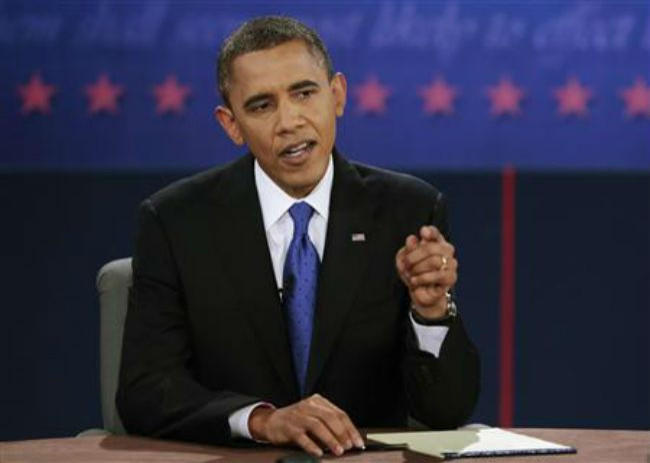
Republican leaders in the U.S. Congress expressed surprise and doubt on Tuesday about President Barack Obama's comment in debate with Republican challenger Mitt Romney that the automatic spending cuts set for the new year "will not happen."
At the same time, they said it was unclear whether the president on Monday night was reflecting a hope, or a possible plan, to avoid the $109 billion in cuts divided between defense and non-defense spending, known as a "sequester," that are to start on January 2.
A spokesman for Senate Republican Leader Mitch McConnell said: "we were all surprised by the President saying that the sequester 'will not happen' given that he still hasn't presented a plan to make sure it 'will not happen.'"
"While the Republican-led House has already taken action, Democrats in the Senate haven't even passed a budget, and the President has presented no plan to prevent the defense cuts." The divided Congress is controlled in the House of Representatives by Republicans and the Senate by Democrats.
David Plouffe, White House senior adviser, was quoted suggesting to reporters in the spin room after Monday night's debate that Obama was merely expressing the same desire as everyone else. "No one wants it to happen. ... No one thinks it should happen," he said.
Still, some analysts were taking the president's comment quite seriously. Greg Valliere, of Potomac Research Group, called it "the most significant statement in last night's debate: The president said a budget sequester "will not happen." This is the clearest indication yet that the fiscal cliff may be finessed or delayed."
The cuts are part of the so-called "fiscal cliff" of tax increases and spending reductions scheduled for the end of the year that the Congressional Budget Office has said could lead to a recession.
Kevin Smith, a spokesman for Speaker of the House John A. Boehner, said, "If the sequester isn't going to happen, as he says, will the president finally offer a plan to solve the problem? For the past year, the president has refused to show any leadership in resolving the sequester he proposed, so forgive us if we have doubts about his newfound desire to tackle the issue."
Republicans and Democrats alike oppose the trigger of the large spending cuts, in part because they land on almost every account in military and non-military programs, depriving Congress of the ability to think through the choices.
Congressional aides have said one of the ideas to help avoid the "fiscal cliff" would be to replace the automatic cuts with more targeted savings of about $55 billion. Later in the year, other ways to cut the burgeoning deficit would be looked at.
But it would not solve the problem of how to handle the $400 billion in a range of tax breaks enacted in 2001 and 2003 that are to expire December 31.
Obama made the remark almost in passing as part of his response to criticism about his defense spending plans from Republican opponent Mitt Romney and charges that the sequestration was his administration's idea in the first place.
"First of all, the sequester is not something that I've proposed," he said. "It is something that Congress has proposed. It will not happen."
© Thomson Reuters.




